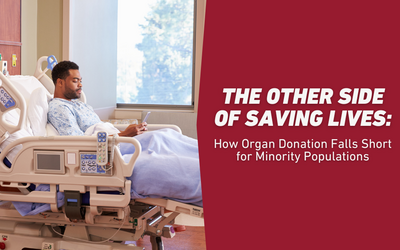
Organ donation saves thousands of lives each year, but not all communities benefit equally. Minority populations — particularly African American, Hispanic, and Native American communities — face significant disparities accessing transplants and participating in donation programs. National Donate Life Month and National Minority Health Month, both observed in April, are an opportunity to understand these disparities and begin taking steps to create a more inclusive and effective donation system that serves everyone.
- Minority communities often face disparities in organ donation rates. Studies have shown that African Americans, Hispanic Americans, Native Americans, and other racial/ethnic minorities are less likely to register as organ donors compared to white Americans. This lower rate of participation in organ donation programs contributes to a shortage of organs available for minority patients who need transplants.
- Minority communities also face disparities in health outcomes. Some minority groups are at higher risk for certain health conditions like kidney disease, diabetes, hypertension, and liver disease. These conditions can lead to the need for organ transplants. African Americans have higher rates of chronic kidney disease (CKD), for example, and are more likely to develop end-stage renal disease (ESRD), which often requires a kidney transplant. These disparities in health outcomes mean that minority populations are in greater need of organ donations, but the supply of organs from minority donors doesn't always match the demand.
- Tissue matching is often harder to achieve in minority populations. Minority groups may experience better outcomes when receiving organs from donors of similar racial/ethnic backgrounds due to more compatible tissue matching. However, because there are fewer organ donors from minority groups, this matching is often harder to achieve, leading to longer wait times for transplantation and potentially worse outcomes for these patients.
- Historical mistrust of the healthcare system is a significant barrier to organ donation from minority communities. Past unethical practices and exploitation of minority groups in medical research have led to a sense of distrust toward the healthcare system. This has led to lower participation rates in organ donation programs and lower rates of willingness to donate organs or receive organ transplants within these communities.
What You Can Do
- Understand the types of donation.
- Register as an organ, eye and tissue donor.
- Learn about protections for living donors like paid leave, insurance protections and extended family medical leave.
- Learn about and participate in chronic kidney disease task forces which examine CKD, transplantation, donation and higher disease rates in minority populations.
- Learn how federal funding decisions impact kidney health and transplant access.